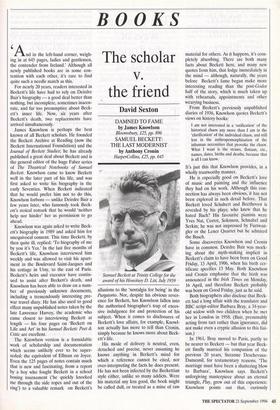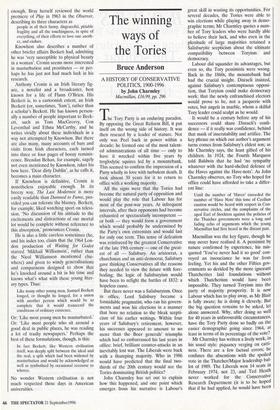BOOKS
The scholar V.
the friend
David Sexton DAMNED TO FAME by James Knowlson Bloomsbury, £25, pp. 896 SAMUEL BECKETT: THE LAST MODERNIST by Anthony Cronin HarperCollins, £25, pp. 645
nd in the left-hand corner, weigh- ing in at 645 pages, ladies and gentlemen, the contender from Ireland.' Although all newly published books are in some con- tention with each other, it's rare to find quite such a needle match as this.
For nearly 20 years, readers interested in Beckett's life have had to rely on Deirdre Bair's biography — a good deal better than nothing, but incomplete, sometimes inaccu- rate, and far too presumptive about Beck- ett's inner life. Now, six years after Beckett's death, two replacements have arrived simultaneously.
James Knowlson is perhaps the best known of all Beckett scholars. He founded the Beckett Archive at Reading (now the Beckett International Foundation) and the Journal of Beckett Studies; he has already published a great deal about Beckett and is the general editor of the huge Faber series of The Theatrical Notebooks of Samuel Beckett. Knowlson came to know Beckett well in the later part of his life, and was first asked to write his biography in the early Seventies. When Beckett indicated that he would prefer him not to do this, Knowlton forbore — unlike Deirdre Bair a few years later, who famously took Beck- ett's stoical remark that he would 'neither help nor hinder' her as permission to go ahead.
Knowlton was again asked to write Beck- ett's biography in 1989 and asked him for unequivocal consent. This time Beckett, by then quite ill, replied: 'To biography of me by you it's Yes.' In the last five months of Beckett's life, Knowlton interviewed him weekly and was allowed to visit his apart- ment in the Boulevard Saint-Jacques and his cottage in Ussy, to the east of Paris. Beckett's heirs and executor have contin- ued to assist after Beckett's death, and Knowlson has been able to draw on a num- ber of previously unknown documents, including a tremendously interesting pre- war travel diary. He has also used to good effect many unpublished notes taken by the late Lawrence Harvey, the academic who came closest to interviewing Beckett at length — his four pages on 'Beckett on Life and Art' in his Samuel Beckett: Poet & Critic are excellent.
The Knowlton version is a formidable work of scholarship and documentation which seems unlikely ever to be super- seded: the equivalent of Ellman on Joyce. Even the 125 pages of notes contain much that is new and fascinating, from a report by a boy who fought Beckett in a school boxing tournament ('he quickly knocked me through the side ropes and out of the ring') to a valuable remark on Beckett's Samuel Beckett at Trinity College for the award of his Honorary D. Litt, J144, 1959 allusions to the 'nostalgia for being' in the Purgatorio. Nor, despite his obvious rever- ence for Beckett, has Knowlton fallen into the authorised biographer's trap of exces- sive indulgence for and protection of his subject. When it comes to disclosures of Beckett's love affairs, for example, Knowl- ton actually has more to tell than Cronin, simply because he knows more about Beck- ett's life.
His mode of delivery is neutral, even, detached and precise, never assuming he knows anything in Beckett's mind for which a reference cannot be cited, nor over-interpreting the facts he does present. He has not been infected by the Beckettian style either, unlike so many addicts. Were his material any less good, the book might be called dull, or treated as a mine of raw
I am not interested in a 'unification' of the historical chaos any more than I am in the 'clarification' of the individual chaos, and still less in the anthropomorphisation of the inhuman necessities that provoke the chaos. What I want is the straws, flotsam, etc., names, dates, births and deaths, because that is all I can know.
It's just this that Knowlton provides, in a wholly trustworthy manner.
He is especially good on Beckett's love of music and painting and the influence they had on his work. Although this con- nection has always been obvious, it has not been explored in such detail before. That Beckett loved Schubert and Beethoven is revealed by his plays; who knew that he hated Bach? His favourite pianists were Yves Nat, Cortot, Solomon, Schnabel and Serkin; he was not impressed by Furtwan- gler or the Lener Quartet but he admired the Busch.
Some discoveries Knowlton and Cronin have in common, Deirdre Bair was mock- ing about the myth-making implicit in Beckett's claim to have been born on Good Friday, 13 April, 1906, when his birth cer- tificate specifies 13 May. Both Knowlton and Cronin emphasise that the birth was announced in the Irish Times on Monday, 16 April, and therefore Beckett probably was born on Good Friday, just as he said. Both biographers also disclose that Beck- ett had a long affair with the translator and BBC script-editor Barbara Bray, a 34-year- old widow with two children when he met her in London in 1958. (Bair, presumably acting from tact rather than ignorance, did not make even a cryptic allusion to this liai- son.) In 1961, Bray moved to Paris, partly to be nearer to Beckett — but that year Beck- ett finally married his companion of the previous 20 years, Suzanne Deschevaux- Dumesnil, for testamentary reasons. 'The marriage must have been a shattering blow to Barbara', Knowlton says. Beckett's unforgiving masterpiece about an eternal triangle, Play, grew out of this experience. Knowlton points out that, curiously material for others. As it happens, it's com- pletely absorbing. There are both niany facts about Beckett here, and many new quotes from him, that lodge immediately in the mind — although, naturally, the years before Beckett's fame began make more interesting reading than the post-Godot half of the story, which is much taken up with rehearsals, appointments and other
From Beckett's previously unpublished diaries of 1936, Knowlson quotes Beckett's views on history books:
enough, Bray herself reviewed the world premiere of Play in 1963 in the Observer, describing its three characters as
people in all their funny, disgraceful, pitiable fragility and all the touchingness, in spite of everything, of their efforts to love one anoth- er, and endure.
Know'son also describes a number of other briefer affairs Beckett had, admitting he was `very susceptible to physical beauty in a woman'. Cronin seems more interested in masturbation and prostitutes — or per- haps he has just not had much luck in his research.
Anthony Cronin is an Irish literary fig- ure, a novelist and a broadcaster, best known for a life of Flann O'Brien. His Beckett is, to a cartoonish extent, an Irish Beckett (or, sometimes, `Sam), rather than a scholar's Beckett. He has known person- ally a number of people important to Beck- ett, such as Tom MacGreevy, Con Leventhal and Ethna McCarthy, and he writes vividly about these individuals in a way not attempted by Knowlson. But there are also many, many accounts of bars and visits from Irish characters, each turned into three or four pages of boozy reminis- cence. Brendan Behan, for example, sagely not even mentioned by Knowlson, takes his bow here. 'Dear dirty Dublin', as he calls it, becomes a main character.
If Knowlson is definitive, Cronin is nonetheless enjoyable enough. In its breezy way, The Last Modernist is more easily readable than Damned to Fame, pro- vided you can tolerate the blarney. Beckett, for example, liked watching sport on televi- sion. 'No discussion of his attitude to the excitements and distractions of our mortal lot would be complete without reference to this absorption,' pronounces Cronin.
He is also a little careless sometimes (he, and his index too, claim that the 1964 Lon- don production of Waiting for Godot starred `Mikhail Williamson', rather than the Nicol Williamson mentioned else- where) and given to windy generalisations and comparisons designed to show that he's knocked around a bit in his time and knows what's what with these young liter- ary types. Thus:
Like many other young men, Samuel Beckett longed, or thought he longed, for a union with another person which would be so complete that it would transcend the conditions of ordinary existence.
Or: 'Like most young men he masturbated.' Or: 'Like most people who sit around a good deal in public places, he was reading a lot of trashy newspapers.' Perhaps the best of these formulations, though, is this: In fact Beckett, like Western civilisation itself, was deeply split between the ideal and the real, a split which had been widened by masturbation and would be acknowledged as well as symbolised by occasional recourse to whores.
No wonder Western civilisation is not much respected these days in American universities.



















































































 Previous page
Previous page